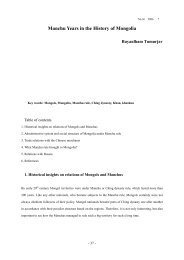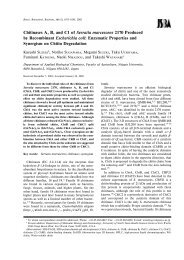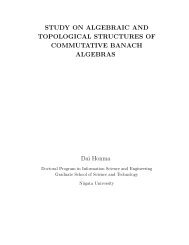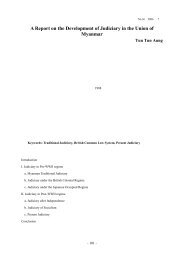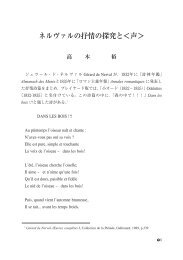An Overview of the Albanian History:
An Overview of the Albanian History:
An Overview of the Albanian History:
You also want an ePaper? Increase the reach of your titles
YUMPU automatically turns print PDFs into web optimized ePapers that Google loves.
No.34 2005 12 <br />
Despite <strong>the</strong>se advances, however, education in Albania suffered as a result <strong>of</strong> restrictions on freedom <strong>of</strong><br />
thought. For example, education institutions had scant influence on <strong>the</strong>ir own curricula, methods <strong>of</strong> teaching,<br />
or administration.<br />
After Stalin died in March 1953, Tirana soon came under pressure from Moscow to copy, at least formally,<br />
<strong>the</strong> new Soviet model for a collective leadership. In July 1953, Hoxha handed over <strong>the</strong> foreign affairs and<br />
defense portfolios to loyal followers, but he kept both <strong>the</strong> top party post and <strong>the</strong> premiership until 1954, when<br />
Shehu 58<br />
became Albania's prime minister. The Soviet Union, responding with an effort to raise <strong>the</strong> <strong>Albanian</strong><br />
leaders' morale, elevated diplomatic relations between <strong>the</strong> two countries to <strong>the</strong> ambassadorial level.<br />
Despite some initial expressions <strong>of</strong> enthusiasm, Hoxha and Shehu mistrusted Nikita Khrushchev's programs<br />
<strong>of</strong> “peaceful coexistence” and “different roads to socialism” because <strong>the</strong>y appeared to pose <strong>the</strong> threat that<br />
Yugoslavia might again try to take control <strong>of</strong> Albania. Tirana and Belgrade renewed diplomatic relations in<br />
December 1953, but Hoxha refused Khrushchev's repeated appeals to rehabilitate posthumously <strong>the</strong><br />
pro-Yugoslav Xoxe as a gesture to Tito. The <strong>Albanian</strong> duo instead tightened <strong>the</strong>ir grip on <strong>the</strong>ir country's<br />
domestic life and let <strong>the</strong> propaganda war with <strong>the</strong> Yugoslavs grind on. In 1955 Albania became a founding<br />
member <strong>of</strong> <strong>the</strong> Warsaw Treaty Organization, better known as <strong>the</strong> Warsaw Pact 59 , <strong>the</strong> only military alliance <strong>the</strong><br />
nation ever joined. Although <strong>the</strong> pact represented <strong>the</strong> first promise Albania had obtained from any <strong>of</strong> <strong>the</strong><br />
communist countries to defend its borders, <strong>the</strong> treaty did nothing to assuage <strong>the</strong> <strong>Albanian</strong> leaders' deep<br />
mistrust <strong>of</strong> Yugoslavia.<br />
Hoxha and Shehu tapped <strong>the</strong> <strong>Albanian</strong>s' deep-seated fear <strong>of</strong> Yugoslav domination to remain in power during<br />
<strong>the</strong> thaw following <strong>the</strong> Twentieth Party Congress <strong>of</strong> <strong>the</strong> Communist party <strong>of</strong> <strong>the</strong> Soviet Union's in 1956, when<br />
Khrushchev denounced Stalin's crimes in his speech. Hoxha defended Stalin and blamed <strong>the</strong> Titoist heresy for<br />
<strong>the</strong> troubles vexing world communism, including <strong>the</strong> disturbances in Poland and <strong>the</strong> rebellion in Hungary in<br />
1956. Hoxha mercilessly purged party moderates with pro-Soviet and pro-Yugoslav leanings, but he toned<br />
down his anti-Yugoslav rhetoric after an April 1957 trip to Moscow, where he won cancellation <strong>of</strong> about<br />
US$105 million in outstanding loans and about US$7.8 million in additional food assistance. By 1958,<br />
however, Hoxha was again complaining about Tito's “fascism” and “genocide” against <strong>Albanian</strong>s in Kosovo.<br />
He also grumbled about a Comecon plan for integrating <strong>the</strong> East European economies, which called for<br />
Albania to produce agricultural goods and minerals instead <strong>of</strong> emphasizing development <strong>of</strong> heavy industry.<br />
On a twelve-day visit to Albania in 1959, Khrushchev reportedly tried to convince Hoxha and Shehu that<br />
<strong>the</strong>ir country should aspire to become socialism’s “orchard” 60 .<br />
- 257 -



